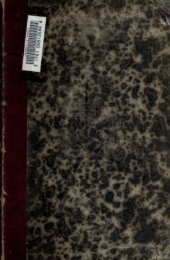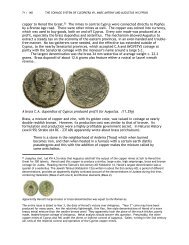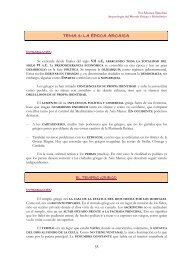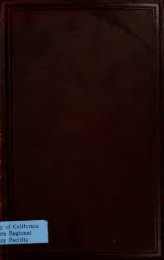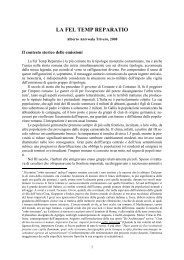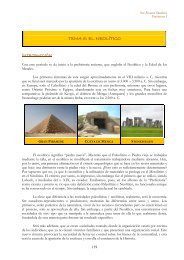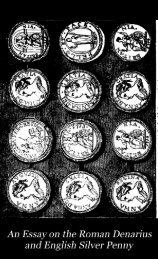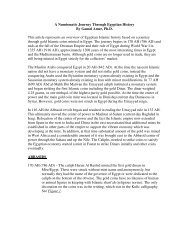Numismata hellenica: a catalogue of Greek coins; with notes, a map ...
Numismata hellenica: a catalogue of Greek coins; with notes, a map ...
Numismata hellenica: a catalogue of Greek coins; with notes, a map ...
Create successful ePaper yourself
Turn your PDF publications into a flip-book with our unique Google optimized e-Paper software.
16]<br />
pollonia (Lyciae), description <strong>of</strong> a coin <strong>of</strong> this city, As.<br />
144.<br />
(Mygdonise), its ancientname preserved; situated<br />
on the road from Thessalonica to Amphipolis, near the<br />
Chalcidic silver mines, Eu. 16.<br />
(Mysise or Ad its Rhyndacum), ancient name<br />
still preserved ; the legend on its <strong>coins</strong> 'AiroXXuvi. Pw.,<br />
As. 26.<br />
(Pisidise), now Oloburlu, As. 100.<br />
Apollonis (Lydise), the As. 26.<br />
legend <strong>of</strong> its <strong>coins</strong> 'AiroXXwwJewv,<br />
ApoUonos Hieron (Lydise), the legend <strong>of</strong> its <strong>coins</strong> 'AiroX-<br />
XtovottptiTtoVf As. 26.<br />
'AiroXKavoe Kprjvr], the great fountain at Gyrene anciently<br />
so called, Af. 2.<br />
in the Gulf <strong>of</strong><br />
Aptara or Aptera (Cretee), now Paleokastro,<br />
Suda, said to have been founded by Apteras or Pteras<br />
<strong>of</strong> Delphi, Ins. 3.<br />
Aquilonia (Samnii), the chief town <strong>of</strong> Samniura, called<br />
Acurunia by theSamnites, now Lacedogna, Eu. 111.<br />
Aquinum (Volscorum), now Aquino, its types similar to<br />
those <strong>of</strong> the neighbouring cities Venafrum, Suessa,<br />
Tiana or Teanum, and Gales, Eu. 111.<br />
Arachthus, this river typified by the bull on some <strong>coins</strong> <strong>of</strong><br />
Ambracia Epiri, Eu. 9-<br />
Aradii. See Marathus Phoeniciae.<br />
Aradus (Phoeniciae) situated on an island now called Ruad ;<br />
259 B.C. the commencement <strong>of</strong> its cera. As. 26 : Ephesian<br />
types on one <strong>of</strong> its <strong>coins</strong>, Xs. 27. Ins. IQ.<br />
Araplus, now Aropos, on the north-western coast <strong>of</strong> the<br />
Thracian Chersonese, Eu. 8.<br />
Arcadia, Jupiter, Pan, and Despoena the chief types <strong>of</strong><br />
its <strong>coins</strong> ; its earlier silver struck at Lycosura, its later<br />
at Megalopolis, Eu. 17.<br />
(Cretse), physical resemblance <strong>of</strong> its district to<br />
that <strong>of</strong> Arcadia in the Peloponnesus ; the name <strong>of</strong> this<br />
city recorded on <strong>coins</strong>, in an inscription, and by Polybius<br />
and Strabo, Ins. 4.<br />
Areas, son <strong>of</strong> Callisto, his bones preserved in the temple <strong>of</strong><br />
Juno at Mantineia, Eu. 69: his name inscribed and his<br />
mythus alluded to on a coin <strong>of</strong> Pheneus Arcadiae, Eu.<br />
163.<br />
Archagetes a common epithet <strong>of</strong> Apollo as a reputed leader<br />
<strong>of</strong> colonial enterprises, Ins. 78.<br />
Archebius, coin <strong>of</strong> a king <strong>of</strong> Bactria <strong>of</strong> that name ; impossibility<br />
<strong>of</strong> assigning a date to his reign and those <strong>of</strong><br />
some other princes <strong>of</strong> Bactria, but probably not later<br />
than 100 e.g., K. 56.<br />
Archelaus, king <strong>of</strong> Gappadocia, grandson <strong>of</strong> Mithradates<br />
VI. <strong>of</strong> Pontus, K. 47 : Sebaste Giliciae founded or<br />
augmented by him ; his kingdom increased by Au-<br />
gustus, As. 109.<br />
II. <strong>of</strong> Macedonia, the goats on his <strong>coins</strong> allusive<br />
to the mythus <strong>of</strong> Garanus, founder <strong>of</strong> the monarchy<br />
at Edessa (afterwards called .iEgae, from ail, a goat),<br />
K. 1.<br />
Areion, his mytiius alluded to on <strong>coins</strong> <strong>of</strong> Brentesium Galabrise,<br />
and <strong>of</strong> Methymna Lesbi, <strong>of</strong> which latter<br />
a native, Eu. 113.<br />
he was<br />
Arethusa. See Amphaxitis.<br />
Argissa (Thessaliae) a Homeric city near the place where<br />
Larissa was afterwai'ds founded, Eu. 162.<br />
Argithea, capital <strong>of</strong> the Athamanes, in the valley <strong>of</strong> the<br />
Upper Achelous ; <strong>coins</strong> <strong>of</strong> the Athamanes there struck,<br />
Eu. 20.<br />
Argos (Amphilochise), its Corinthian origin shown by its<br />
didrachma; remains <strong>of</strong> its walls still e.xtant at Neokhdri,<br />
at the eastern end <strong>of</strong> the Gulf <strong>of</strong> Arta, Eu. 8. 18.<br />
(Argolidis), the types <strong>of</strong> its <strong>coins</strong> relate to the<br />
INDEX TO THE NOTES.<br />
worship <strong>of</strong> Juno Antheia, Perseus, Hercules, Diana, and<br />
Hecate ; the wolf on its <strong>coins</strong> asyrabol <strong>of</strong> Apollo Lycius;<br />
the emperor Hadrian styled jcriurijc for having restored<br />
its Nemeian games, Eu. 18—21 : its <strong>coins</strong> as member<br />
<strong>of</strong> the Achaian League, Eu. 3.<br />
Argostolium, now Argostoli, the port <strong>of</strong> Cranii Cephallenise,<br />
Ins. 14.<br />
Ariamnes II., first king <strong>of</strong> Gappadocia, K. 45.<br />
Arianes, king <strong>of</strong> Parthia, a contemporary <strong>of</strong> Claudius,<br />
apparently the same as Gotarzes or Arzaces XXI.,<br />
K. 54.<br />
Arianian characters on <strong>coins</strong> <strong>of</strong> Menandrus <strong>of</strong> Bactria not<br />
to be found on <strong>coins</strong> <strong>of</strong> kings <strong>of</strong> Bactria Proper,<br />
K. 55.<br />
Ariarathes III. <strong>of</strong> Gappadocia, son <strong>of</strong> Ariamnes II., K. 45.<br />
IV. (Eusebes), son <strong>of</strong> Ariarathes III., K. 45.<br />
v., reasons for attributing <strong>coins</strong> to him ; called<br />
Ariarathes VI. by Mionnet; styled himself Philopator<br />
and Eusebes, K. 45.<br />
VI. (Epiphanes), son <strong>of</strong> Ariarathes V., K. 45.<br />
VII. (Philometor), son <strong>of</strong> Ariarathes VI., K. 46.<br />
K. 46.<br />
VIII., surnamed Eusebes and Philadelphus,<br />
Ariminum (Umbriae), now Rimini; similarity <strong>of</strong> its <strong>coins</strong><br />
to those <strong>of</strong> other places conquered and colonized by the<br />
Romans in the third century b.c, Eu. 111.<br />
Ariobarzanes I. <strong>of</strong> Gappadocia surnamed Philoromaeus,<br />
K. 46.<br />
K. 46.<br />
II. (Philopator), son <strong>of</strong> Ariobarzanes I.,<br />
Arisba an jEolic city in the island <strong>of</strong> Lesbus extinguished<br />
by Methymna, Ins. 33.<br />
Aristaeus, son <strong>of</strong> Apollo, the colonizer <strong>of</strong> the island <strong>of</strong><br />
Geos from Arcadia : the types <strong>of</strong> the <strong>coins</strong> <strong>of</strong> the cities<br />
<strong>of</strong> Geos chiefly allusive to his worship, Ins. 5.<br />
Aristarchus made king <strong>of</strong> Colchis by Pompey; a coin <strong>of</strong><br />
his, K. 51.<br />
, brother <strong>of</strong> Gassander, founds Uranopolis,<br />
on the isthmus <strong>of</strong> the peninsula <strong>of</strong> Athos, Eu. 109.<br />
Aristobulus <strong>of</strong> Gassandria. See Tarsus Ciliciae.<br />
Ariston, son <strong>of</strong> Audoleon <strong>of</strong> Paeonia, betrayed by Lysimachus,<br />
who takes possession <strong>of</strong> his kingdom, K. 20.<br />
Aristonicus, king <strong>of</strong> Pergamus, defeats Crassus Mucianus ;<br />
is himself defeated and captured by Perpenna, and put<br />
to death at Rome, K. 66.<br />
Armenia renounces the authority<br />
25.<br />
<strong>of</strong> Antiochus III., K.<br />
Arne the Pelasgic name <strong>of</strong> Cbaeroneia<br />
Cierium Thessaliae, Eu. 34, 35.<br />
Boeotise, and <strong>of</strong><br />
Aroe, an ancient Achaian town, enlarged by Patreus,<br />
afterwards called Patrae, Eu. 84.<br />
and<br />
said to have been founded<br />
Arpi or Argyrippa (Apu)iae),<br />
by Diomedes : its remains near Foggia still called Arpi,<br />
Eu. Ill, 112. 124.<br />
Arsaces I., king <strong>of</strong> Parthia, founder <strong>of</strong> the Parthian<br />
dynasty, K. 53.<br />
II., or Tiridates, Seleucus II. <strong>of</strong> Syria defeated<br />
and made prisoner by him ; resemblance <strong>of</strong> the head-<br />
dress on his coin to that <strong>of</strong> the king <strong>of</strong> Persia in the<br />
great mosaic <strong>of</strong> Pompeii and on the supposed coin <strong>of</strong><br />
Artaxerxes I., K. 53.<br />
v., or Phrahates I., a contemporary <strong>of</strong> Antiochus<br />
IV. <strong>of</strong> Syria, K. 53.<br />
XV., or Phrahates IV., defeats M. Antonius, K. 53.<br />
XVIII. See Onones.<br />
XXI. See Arianes.<br />
Arsinoe (Gretae), its former existence proved only by its<br />
<strong>coins</strong> ; its situation on the eastern coast <strong>of</strong> Crete,<br />
Ins. 4.



